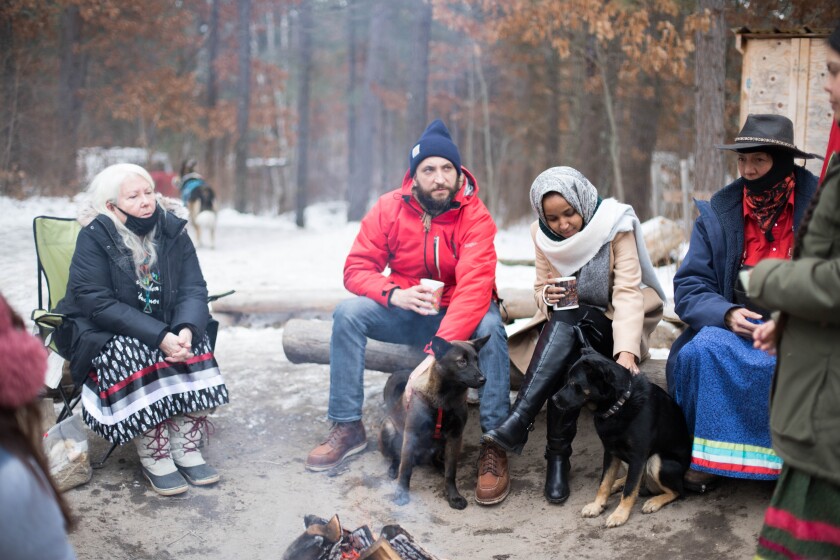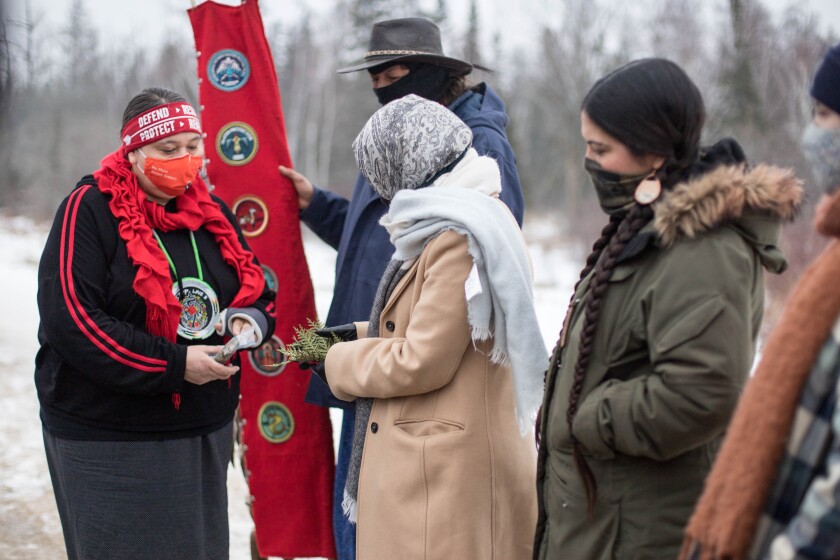BEMIDJI -- U.S. Rep. Ilhan Omar, D-Minn., met with a small group of Indigenous leaders, water protectors, concerned citizens, politicians and activists on Saturday to learn more about their opposition to the Enbridge Line 3 pipeline replacement project.
The group, which was hosted by the Giniw Collective and included voices from organizations MN350 and the RISE Coalition, showed the representative around some landmarks near Park Rapids and Bemidji, taking Omar to an opposition camp, a proposed river crossing and a pipeline equipment storage area. Omar ended the day in Bemidji with a listening session at the Rail River Folk School.
Though Omar represents Minnesota’s fifth district, she came to the seventh district to see the impact of the pipeline project for herself, advocating that the issues related to Line 3 are things the whole state needs to address.
“Line 3 isn’t just going to impact this community,” Omar said while speaking in Bemidji. “All of Minnesota will eventually be impacted. If we are not feeling it today, then our children, our grandchildren (will).”
She added, borrowing a sentiment from her colleague and Massachusetts Rep. Ayanna Pressley, that she believes, “Those who are closest to the pain should be closest to the solution and that’s the reason I am here today.”
ADVERTISEMENT
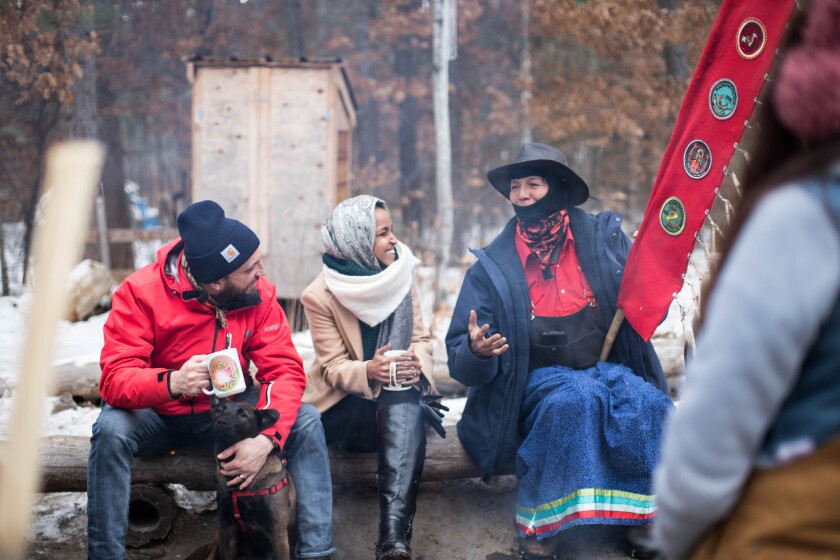
Opponents of the project, who call themselves water protectors, shared their stories with Omar -- who has been vocal in her opposition to the project. Throughout the day, she and her staff were collecting stories and taking video to share with other lawmakers in Washington.
“We owe it to future generations, to the Indigenous communities we've signed treaties with, and to every living being on this planet to stop building fossil fuel infrastructure,” Omar tweeted during the day.
Today, I am in Northern Minnesota meeting with indigenous leaders organizing to #StopLine3.
— Rep. Ilhan Omar (@Ilhan) January 30, 2021
We owe it to future generations, to the indigenous communities we've signed treaties with, and to every living being on this planet to stop building fossil fuel infrastructure. pic.twitter.com/7eMbUbZ7In
The group visited an opposition camp a few miles outside of Park Rapids, where those in protest of the project have been stationed for a couple of years.
Some Indigenous leaders there spoke of the cultural and spiritual meaning of the land in the area, and the plants and animals that call the spaces home.
ADVERTISEMENT
Omar was then shown the Headwaters of the Mississippi River, and the space where the pipeline is projected to cut across the river. While there, she filmed a video directed toward constituents with stories from the water protectors.
“Thank you all for the hospitality, it feels great to be here,” Omar said to her hosts. “There are a lot of reasons to feel hopeless, but there are a lot of reasons to be hopeful.”
Keystone XL vs. Line 3
Enbridge's Line 3 replacement project will build a new oil pipeline to replace the current Line 3, which was installed in the 1960s. Currently, the existing pipeline is operating at half capacity because of its age and condition. The majority of Line 3 has already been replaced in Canada, North Dakota and Wisconsin, leaving roughly 340 miles in Minnesota yet to be completed.
Unlike the existing pipeline's 34-inch diameter, the new Line 3 will be 36 inches. More than 1,000 miles long, the new pipeline will carry an average of 760,000 barrels of oil per day from Edmonton, Alberta to Superior, Wis., where a terminal is located.
Many present during the tour and at the listening session on Saturday expressed frustration with Minnesota Gov. Tim Walz's administration for not halting construction, and many approached new President Joe Biden's administration with skepticism.
Biden recently rescinded a permit, curtailing the Keystone XL pipeline cutting through Montana, South Dakota and Nebraska. Those opposing Line 3 hope it will face a similar fate.
ADVERTISEMENT
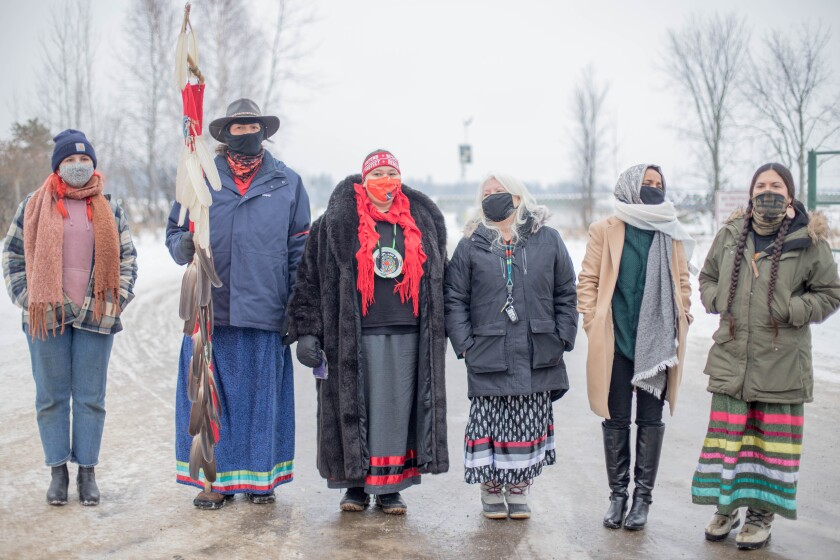
Enbridge Energy spokeswoman Juli Kellner told the Pioneer on Sunday that the projects differ as, “unlike Keystone XL, Line 3 is a currently operating pipeline and its replacement was ordered by a federal consent decree during the Obama Administration.”
“Canceling Keystone without canceling Line 3 is just trading one evil for another,” Tara Houska, a tribal attorney and Couchiching First Nation member who has been vocal and strongly opposed to Line 3 since its inception, said during the tour on Saturday. She spoke to Omar about how she believes one can’t regionalize the climate crisis -- that this issue is everyone’s issue.
“You can’t control it to only this specific state, ‘the emissions only count in this space,’ no, they’re everywhere, that’s how the globe works, that’s how the environment, an ecosystem works,” Houska said.
“It means the world to me to have you here, trying to uplift this fight and using your influence and your access into those spaces that have been so broken, to help us have a voice and to help what we’re trying to give a voice to, to have a voice also,” she added. “It’s maddening to me, to have to advocate on an issue that’s so simple.”
Other Indigenous voices weighing in were Lorna Hanes and Dawn Goodwin from White Earth Nation, and Nancy Beaulieu from Leech Lake Nation. The three spoke about their perspectives on the pipeline from the standpoint of tribal sovereignty and treaty rights, as well as their experiences fighting against the pipeline so far.
Tribal relations
Enbridge is steadfast in its stance that tribal sovereignty has been respected, and that tribes have been consulted throughout the project.
ADVERTISEMENT
“As the result of negotiations with tribal leadership, Line 3 was routed outside of the Leech Lake Band of Ojibwe Reservation and through the Reservation of the Fond du Lac Band of Lake Superior Chippewa,” Kellner told the Pioneer. “Both Leech Lake and Fond du Lac have spoken and written repeatedly in support of project permits.”
While Fond du Lac and Leech Lake’s tribal governments have expressed support for the project, Red Lake and White Earth Nations have been outspoken against the project and currently have an active federal lawsuit asserting that an assessment completed by the U.S. Army Corps of Engineers in November failed to consider multiple environmental impacts.
“Upgrading an aging line with new pipe made of thicker steel with technologically advanced coatings will better protect Minnesota’s environment and waters for generations to come,” Kellner said.
According to a Jan. 30 Forum News Service article , opponents of Line 3 say the pipeline's construction violates Indigenous treaty rights, risks the chance of an oil spill and deepens reliance on fossil fuels — something they say should be abandoned as soon as possible amid mounting climate change consequences.
The article also explains that the Red Lake Band and White Earth Band want the court to pause permits for Line 3 until the court cases are resolved and the COVID-19 pandemic subsides. The ongoing cases consider whether the correct calculation was used to determine the pipeline was actually needed and whether the environmental impact statement correctly considered environmental effects on the St. Louis River and Lake Superior.
“It isn’t just about what it means for us to collectively fight, to protect the environment, to see ourselves as stewards of the earth that we are allowed to exist on,” Omar said on Saturday. “There shouldn’t be particular people who are thought of as water protectors, we should all be water protectors.”
Audrey Thayer, who is an enrolled White Earth member and serves on the Bemidji City Council, spoke to Omar throughout her visit, sharing her emotions after seeing the pipeline construction site.
“It was a very difficult day for me, because I’d seen the land torn up. I think about everything that matters to me -- it is the rice, it is the trees, it is the water,” she said.
ADVERTISEMENT
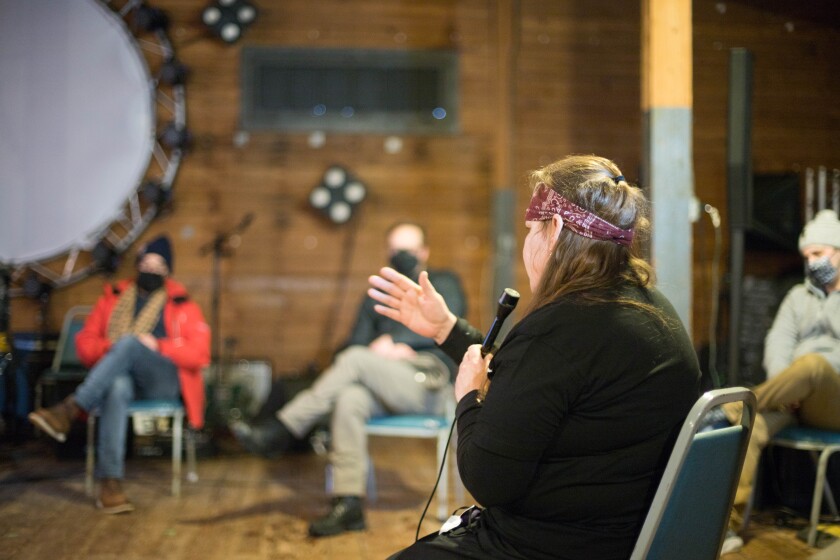
Influx of pipeline workers
During the listening session at Rail River Folk School on Saturday afternoon, Beltrami County Commissioner Reed Olson also spoke to Omar about the issues the county has been facing due to pipeline construction, including housing shortages and safety concerns.
“A community of this size can’t absorb 5,200 workers,” Olson said. “What do we do when we don’t have the capacity in the community?”
Enbridge’s Kellner refuted Olson’s statement, saying, “a single community is not being asked to ‘absorb 5,200 workers.’ That reflects the entire workforce spread across five construction zones from Minnesota’s borders with North Dakota to Wisconsin.”
In Minnesota, 8,600 jobs are anticipated from the project, with 4,200 of them being union. Supporters believe the project will bring additional revenue to northern Minnesota during a slow economy, but some local politicians say they haven’t seen the benefit.
Thayer and Olson both spoke of the immediate impacts the construction has had on Beltrami County and Bemidji, mentioning that pipeline workers have had such difficulty securing lodging that some have sought housing with area shelters.
Olson, who is also the executive director of the Wolfe Center, a local homeless shelter, said ordinarily, client identity is kept very private, but that he has seen Enbridge pipeline workers seeking accommodations at the center.
ADVERTISEMENT
He said that it hasn’t yet come to the point that the shelter has had to choose between sheltering a construction worker who can’t find lodging and someone from the area who is unhoused, but that that prospect worries him.
“Enbridge worked extensively with communities, chambers of commerce, campgrounds, resort owners, hotels and motels along the route of construction to help connect pipeline workers to lodging opportunities,” Kellner said. “We’ve not heard of pipeline workers not finding lodgings. Nor have we heard of anyone staying in area shelters.”





